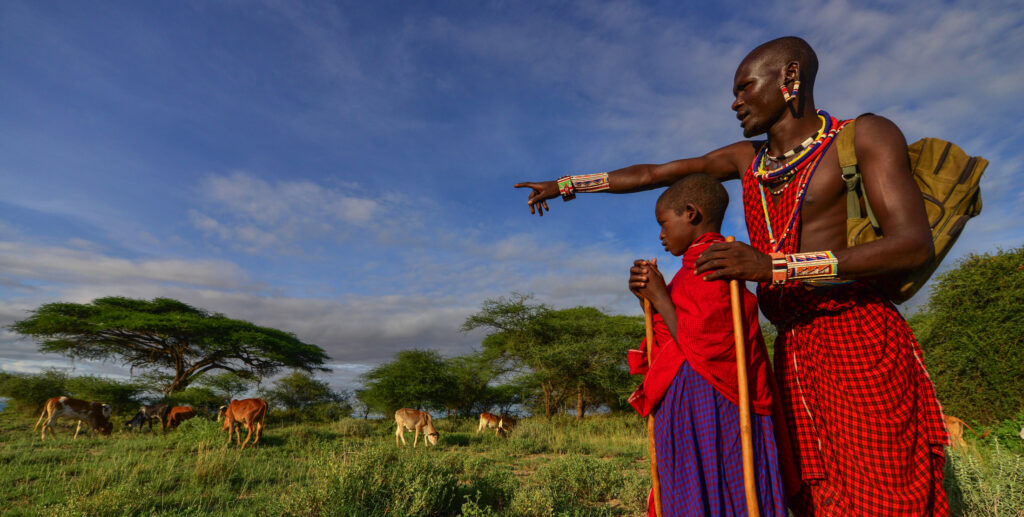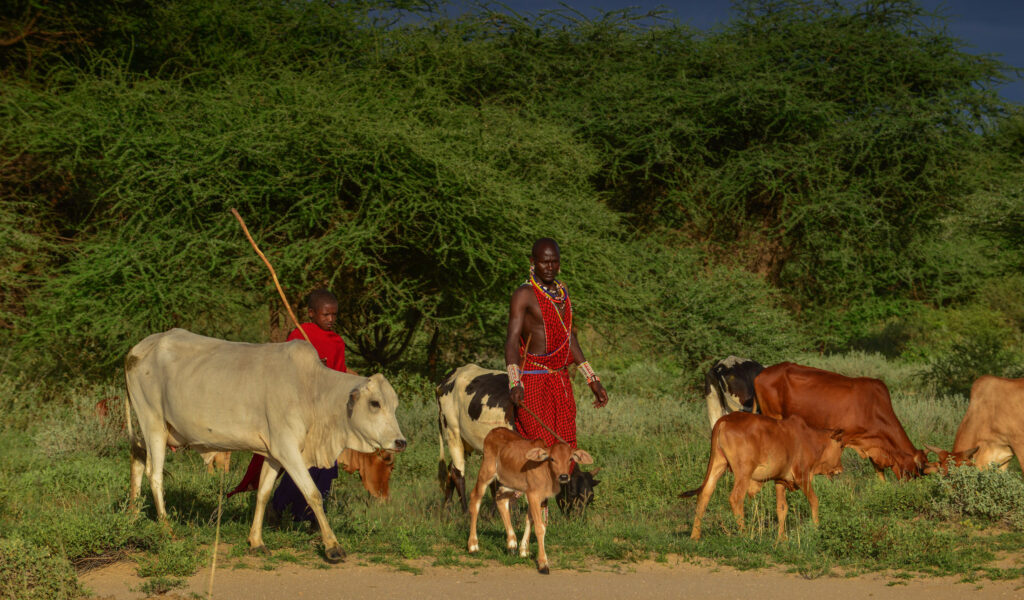Keeping Indigenous Tradition Alive: Elder to Herder Mentorship Program

Livestock herding to the Indigenous Maasai of East Africa is an ancestral tradition that dates back centuries. For the Maasai, livestock herding is a vital practice that protects livestock from predator attacks. Boys are traditionally trained from a young age, ensuring they are fully equipped with the skills and knowledge to become skilled herders by adulthood and eventually pass this expertise to the next generation. However, significant changes are now underway. Over time, there has been a drop in the number of skilled herders, as a result of cultural shifts experienced by the Maasai. One of the reasons for this cultural change is because the youth spend most of their childhoods in classrooms and, upon graduating, migrate to urban areas seeking alternative livelihoods. This migration results in a loss of Indigenous knowledge and Maasai cultural practices, a concern felt deeply by the elders.
Aware of this change taking place across the Amboseli-Tsavo ecosystem, Lion Guardians, in collaboration with the local communities, designed the ‘Elder to Herder Mentorship Program.’ This program involves community elders visiting schools and other locations where the hired herders may gather to educate the youth about traditional herding techniques and practices, deepening their understanding of the significance of pastoralism in Maasai culture. The Elder to Herder Mentorship Program aims to instill a strong foundation of responsible pastoralism, essential for maintaining peaceful human-wildlife coexistence across the Amboseli-Tsavo ecosystem. By actively teaching herding practices, the intention is for the youth to continue passing down this knowledge, preserving Indigenous Maasai culture and herding traditions for the generations to come. In addition, effective herding practices are crucial in preventing human-lion-livestock conflict. By teaching the youth how to herd livestock away from conflict hotspots and understand wildlife behavior, they can keep their animals safe and avoid dangerous encounters. We also believe that by equipping young herders with this crucial knowledge, that we can minimize livestock losses to carnivores which can result in the retaliatory hunting of lions and that instead, herders will feel that with the programs support, they have the knowledge needed to avoid livestock depredations and do not need to resort to retaliatory hunting.
In April 2024, we began piloting the program in four communities Iloirero, Enkii, Inchilishil and Oltepesi, within the Eselenkai Group Ranch. Elders have been visiting schools in these communities twice a week and giving talks at events during the school holidays where the large number of youth and herders gather, such as football matches. This program grew out of research we did several years ago on what makes a good herder in an attempt to mitigate the high number of livestock that is lost (not returned to a livestock corral at night). The Elders provide training to the youth in the following areas:
- How to Become a Good Herder
Becoming a good herder involves several key skills and responsibilities. Herding typically requires moving with livestock from 9 am to 6 pm, and it’s crucial to vigilantly watch over them to prevent attacks or theft. Quickly escorting injured animals to safety is essential. If livestock are lost, reports must be made to the local community and the herder must attempt to track the livestock by following their paths. Furthermore, understanding the economic value of livestock in Maasai society is important, as they provide milk, meat, and financial resources for education and other needs. Additionally, herders should be able to recognize livestock brands, earmarks, colors, patterns, and individual names. Navigation is another essential skill, using landmarks like trees and hills. The length of a herder’s shadow can help estimate the time of day, especially in the morning and evening, to ensure a timely return home.
- Bush Safety
Walking alone in the bush is challenging, especially when the weather quickly changes. Therefore, youths are taught bush safety and navigation. Elders advise walking in the center or beside herds to stay protected from dangerous animals. For safety, herders should avoid sleeping in the bush and refrain from using earphones or radios, as loud sounds can agitate wildlife. If an encounter with a dangerous animal does occur, for example with elephants, hyenas, and lions, herders are taught to remain calm and avoid shouting. Vigilance is crucial: report any suspicious activities, avoiding unknown or unsafe individuals, and always staying alert to potential dangers.
- Respect Wildlife
When becoming a herder, it’s essential for the youth to understand and respect the wildlife and habitat they work in. Herders must maintain a respectful distance from wildlife, as some predators are fast and others, like elephants, can run long distances without tiring. Maasai elders support escorting livestock in the morning, then advise herders on the safest routes, and also support escorting livestock home in the evening.
- Wildlife Behaviors and Predator Tracking
Understanding wildlife behaviors is crucial for herders in the bush. It is very dangerous to approach or provoke animals during mating or while they are eating. Herders practice comparing predator tracks to test their knowledge and skills, as tracks and behaviors can be complex and varied. Some wildlife are very aggressive, while others are more docile, but all should be treated with respect. Predator tracks can be confusing since some species show their claws and others do not. Additionally, sub-adult and female predators are often similar in size.
The good news is that in the short six months since we started piloting the program, the community is reporting that they are experiencing a reduction in livestock depredations in the bush, thanks to the youth participating in the Elder to Herder Mentorship Program. We are currently conducting an in-depth analysis to evaluate the data and gain a clearer understanding of the precise reduction in livestock depredations which we will report back on soon. Finally, given the program’s success thus far, we are hoping to expand this program to other areas and possibly introduce a complimentary ‘Little Lion Guardians’ program, where the youth and herders provide us with in-depth reports on their observations while out herding. Collecting this data will help deepen our understanding of livestock trends, carnivore movements, and depredation patterns and motivate the youth to engage more with positive herding practices.





Leave a Reply